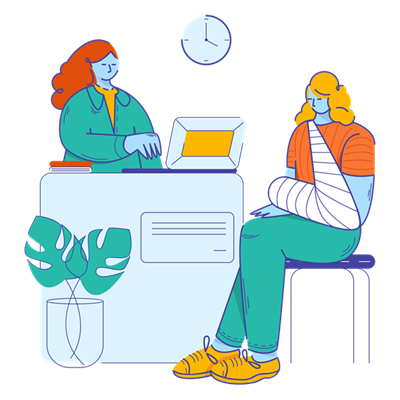
Workman’s compensation in South Africa
1. What defines eligibility for workman’s compensation?
In South Africa, workman’s compensation is governed by the Compensation for Occupational Injuries and Diseases Act (COIDA). This act covers all employees, except domestic workers employed at a private household, members of the South African National Defence Force, South African Police Services, and workers who are totally or partially disabled for less than 3 days.
2. What types of injuries, accidents or illnesses are covered under our workman’s compensation policy?
COIDA covers accidents arising out of and in the course of employment, as well as occupational diseases contracted in the workplace. The act lists specific occupational diseases recognized for compensation.

3. What is the procedure for filing a workman’s compensation claim?
Employees should report the injury to their supervisor or HR immediately, seek necessary medical treatment, and fill out a workman’s compensation claim form. HR will then submit the claim to our insurance provider. The timeline for reporting and filing claims is typically dictated by state law, often within a few days of the incident.

4. What benefits are available to employees under workman’s compensation?
Filing a Claim: In South Africa, the employer is responsible for reporting work-related injuries or diseases to the Compensation Commissioner by submitting a W.CL.2 form (for injuries) or a W.CL.1 form (for diseases), along with supporting documentation. The employee must report the injury or disease to their employer as soon as possible.
The Compensation Fund provides for the payment of medical expenses, temporary total disablement benefits if the employee is unable to work, permanent disability benefits depending on the severity of the disability, and death benefits to dependents of employees who die as a result of their injuries or diseases.
5. Are employees required to see a specific healthcare provider for treatment of a work-related injury?
Employees may be treated by a doctor of their choice. However, the costs covered for treatment are subject to the tariffs set by the Compensation Fund.
6. What is the policy regarding employment termination following a workman’s compensation claim?
Employment Termination: South African labour laws protect employees from unfair dismissal, including termination due to filing a claim for workman’s compensation. Employers must follow fair procedures and have a valid reason for termination unrelated to the claim.
7. What should be done if an employee’s workman’s compensation claim is denied?
Claim Denial and Appeals: If a claim is denied by the Compensation Commissioner, the employee or the employer on behalf of the employee can object to the decision within 90 days by submitting a W929 form. Further appeals are handled by the courts.
8. Is an employee who accepts workman’s compensation benefits still able to sue the company?
Generally, employees covered by COIDA cannot sue their employer for damages in relation to the injury, accident or disease. COIDA provides a no-fault compensation system, meaning compensation is provided regardless of who was at fault for the injury or disease.

9. How long are employees entitled to receive workman’s compensation benefits?
The duration of benefits under COIDA depends on the nature of the injury or disease and the extent of impairment. Temporary disability benefits are provided until the employee recovers, reaches maximum medical improvement, or for a maximum of 24 months. Permanent disability benefits and death benefits are subject to specific calculations based on the severity of the case.
10. What is our role as HR in the workman’s compensation claims process?
As HR administrators, the role includes ensuring compliance with COIDA requirements, assisting in the reporting and documentation of occupational injuries and diseases, facilitating communication between the employee and the Compensation Fund, and managing the return-to-work process.
